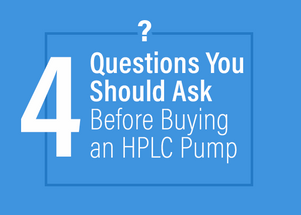Posted by Chrom Tech on 14th Oct 2025
4 Questions You Should Ask Before Buying an HPLC Pump
Chrom Tech’s positive-displacement piston pumps are engineered for precision and versatility, serving a wide range of analytical, clinical, preparative, and fluid-metering applications. While many customers rely on our HPLC pumps for delivering solvents in chemical reaction systems or pharmaceutical manufacturing, these pumps are also used far beyond traditional HPLC workflows — wherever accurate and reliable fluid delivery is required.
How to Choose the Right HPLC Pump for Your Application
Selecting the right HPLC pump depends on multiple factors — including your application type, solvent compatibility, flow requirements, and sensitivity to pulsation. Below, we break down key considerations to help you determine the best pump configuration for your lab or process.
1. Consider the Application
The first question our technical team always asks is: “What is your application?” This isn’t about intricate experiment details — we’re primarily looking to identify the types of solvents being used. Different solvents interact differently with the pump’s wetted materials, so it’s critical to verify material compatibility to prevent corrosion, swelling, or chemical degradation over time.
Chrom Tech offers pumps with various wetted material options, including stainless steel, titanium, and PEEK, to ensure compatibility with aqueous, organic, or corrosive solvents.
2. Determine Whether You Need Constant Flow or Constant Pressure
Some applications require a constant flow rate (common in analytical chromatography), while others depend on constant pressure — such as column packing or steady solvent delivery into a reactor. Chrom Tech provides both configurations, including:
- Constant flow pumps: Ideal for precise solvent metering and HPLC applications.
- Constant pressure pumps: Suitable for column packing or process applications requiring stable pressure control.
Also, consider the flow rate and pressure limits needed for your application. Chrom Tech’s pump range covers flow rates from microliters to hundreds of milliliters per minute and pressure capabilities up to 10,000 psi.
3. Evaluate Pulsation Requirements
Not every application demands ultra-smooth solvent delivery, but when pulsation control is important, choosing the right pump configuration makes all the difference.
- Single piston pumps (such as the Chrom Tech Single Piston Isocratic Pumps) are cost-effective and compact. They deliver excellent performance where pulsation is acceptable or minor.
- Dual piston pumps (such as the Chrom Tech Dual Piston Isocratic Pumps) drastically reduce pulsation by alternating between two pistons — one delivering solvent while the other refills.
- Pulse dampeners can also be added to single piston systems to minimize pulsation and maintain a more stable flow profile.
If your system demands a consistent baseline, such as in detector-sensitive applications, a dual piston pump or a single piston system with a pulse dampener is recommended.
4. Additional Considerations Before Purchasing
Temperature and solvent conditions can impact both pump performance and longevity. For applications involving heated or chilled solvents, Chrom Tech offers jacketed stainless steel pump heads that maintain temperature consistency throughout operation. These are ideal for temperature-sensitive reactions, crystallizations, or viscous solvent handling.
Other factors to consider include desired flow stability, chemical compatibility, and control interface requirements (manual, analog, or digital integration). Our pumps are compatible with a variety of control options, from basic manual interfaces to advanced RS-232 or analog-controlled systems.
For help identifying the ideal pump for your process, contact Chrom Tech’s support team. Our experts can assist you in selecting the proper configuration for your solvent type, flow rate, and application needs.
Frequently Asked Questions About HPLC Pump Selection
What’s the difference between single piston and dual piston HPLC pumps?
Single piston pumps use one piston for both suction and delivery, which can create minor pulsation. Dual piston pumps alternate between two pistons, providing nearly pulse-free solvent flow and improved baseline stability.
How do I know if my solvents are compatible with the pump?
Check that your solvents are compatible with the pump’s wetted materials. Chrom Tech offers pumps in stainless steel, PEEK, or titanium flow paths to accommodate both aqueous and aggressive organic solvents.
When should I choose a constant pressure pump?
Constant pressure pumps are ideal for column packing or processes requiring a stable, regulated pressure rather than a fixed flow rate. They ensure even distribution of solvent without over-pressurization.

